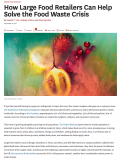Markets for Multiple Retailing
Large retailers are often powerful players in the food sector, particularly in more developed economies. A significant proportion of fish and seafood is sold through multiple retailers in certain countries. Hence, they are important in terms of volume of sales and potential volume of food loss and waste (FLW), as well as their influence on suppliers, upstream activities, and consumer behaviour and habits. The latter is important as in more developed countries, consumers are responsible for most food that is wasted.
Food retailers have the knowledge and means to influence how consumers buy, cook and even store and dispose of fish at home. Ideas include:
- Understanding why some of products are being thrown away by consumers
- Reducing the cognitive distance between the production and consumption of food products by proactively informing consumers how these products came to be
- Making information about products easy to understand
- Applying information technologies to help consumers quantify the amount of food wasted at home
- Helping consumers build a tailored strategy to cut food waste at home
FLW is Associated with Fresh and Chilled Products
FLW is Associated with Fresh and Chilled Products
Findings from a study of the UK retail sector found that FLW is more likely associated with fresh and chilled products. That species with high volume of sales will give rise to lower waste levels and that lower volume or higher value products may be associated with higher waste levels.
Harvard Business School Study on Large Retailers and FLW
Harvard Business School Study on Large Retailers and FLW
A study by the Harvard Business School that could have parallels for the fish supply chain, suggests that retailers start working directly with farmers or encourage their intermediaries to collaborate more with farmers, agricultural food waste can be significantly reduced.
Food retailers can be more systematic in sharing forecast data for specific food items to help producers with their production plans and prevent overproduction. Retailers can also share productivity-enhancing knowledge and techniques to help producers increase their production efficiency and boost product quality. Sainsbury’s adopted a “cost-of-production” model that directly reflects the real costs of the farms, builds in a profit, and rewards farmers for following best animal welfare and environmental standards. Choosing this model over the traditional market pricing model, Sainsbury’s helped dairy farms to stay in business and ensured continuous supply of milk for future years.
This collaborative approach in working with suppliers means treating farmers as partners rather than contractors and investing in the long-term sustainability of the supply chain instead of maximizing returns from a product in the short term. Similarly, Marks and Spencer (M&S) works closely with its farmers to divert surplus farm produce away from waste streams and into food charities with the help of partner organizations like Company Shop and FareShare.
Big food can also partner with agri-tech ventures that seek to help farmers cut waste, increase productivity, and gain better market and distribution access. Apps like Farming Data give smallholder farmers real-time market information, so they can more effectively reach markets and sell their crops. By helping to commercialize these tools, big retailers invest in the continued availability and affordability of quality food supply around the globe.
Key Publications
How Large Food Retailers Can Help Solve the Food Waste Crisis Overview of the relationship between consumer and food waste in the EU. | |
The Role of Food Retailers and Technology in Reducing Consumer Food Waste The report identifies the dilemmas, challenges, opportunities, and role of food retailers in reducing food waste there where it is the highest, at the consumer level. |
More Resources
More Resources
31 October 2023
09 April 2023













